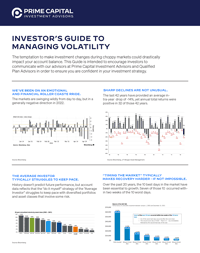You know the old saying about making assumptions. The moral is: don’t make them. When it comes to retirement, there are far too many assumptions people make that can be incredibly detrimental and difficult to recover from. Here are five retirement planning assumptions to avoid on your journey to and through retirement.
Assumption #1: You Won’t Be Working Past Age 65
One dangerous, blanket assumption involves you crossing a metaphorical retirement finish line at the age of 65, never to return to work again. This simply isn’t the case for many. In fact, for folks born 1960 or later, the full retirement age (FRA) set by the Social Security Administration is now 67. In other words, only by waiting until your full retirement age to file for Social Security will you receive your full benefit. And remember, waiting from your FRA until age 70 nets you an additional 8% per year, a rate of return that can be hard to find elsewhere.
Furthermore, according to the 2022 EBRI Retirement Confidence Survey, 41% of Americans surveyed said they plan to continue working past age 65. This is a stark contrast from the results of a survey performed in 1991, three decades prior, where only 11% of folks reported they intended to work past age 65.
Fact: The timing of your retirement does NOT need to meet any societal standards or old-hat rule of thumbs, the timing of your retirement should be based on what is best for you. It’s the pace, not the race that matters here. How long you will work is based on you, and each and every situation is different. People will retire at different ages, times and capacities.
Assumption #2: Underestimating How Long You Will Live
This is another common error people make when it comes to retirement planning. Many people set an estimate somewhere in the range of 80-90 years old when planning for retirement, with no plan for exceeding the allotted life expectancy, or covering long-term care should you become incapacitated. This is a mistake.
Of course, there’s no way to know with certainty the age at which you or your partner will pass. That being said, life expectancy has risen dramatically over recent years and according to the Social Security Administration, a male turning age 65 today can expect to live, on average, until age 84.3, a woman turning age 65 today can expect to live, on average, until age 86.6. Aside from the averages, one in four (25%) of 65-year-olds today will live past age 90, and 10% of folks 65 and older will live past age 95.
Fact: Retirement is lasting longer than ever. This means that a comprehensive retirement plan should include options for guaranteed lifetime income that won’t run out in retirement, in addition to strategies to address the high costs of health care and medical expenses that can be expected with increased longevity.
Assumption #3: Underestimating How Much You’ll Spend
The industry favorite rule of thumb created in 1994 for “safe” spending in retirement has become known as “the 4% rule.” NOTE: It has since been discarded by its creator, Bill Bengen. The 4% rule involves making systematic and regular withdrawals from retirement accounts in an effort to coincide with an estimated life expectancy.
This process opens up many challenges right off the bat. First, using an arbitrary figure as the only variable in a critical equation can expose you to risks that may not only be challenging to recover from, but may destroy your retirement as many people experienced during the global economic recession in 2008.
Fact: No one has a crystal ball when it comes to the stock market. Rather than hoping that you retire during an up-market cycle so you can safely withdraw 4% of your money every year from your accounts invested in bonds and stocks—while simultaneously worrying about running out of money before you run out of life—instead, work with a financial advisor to create a comprehensive and customized plan. Make sure your plan incorporates a realistic budget or plan for spending in retirement along with how you will generate streams of income from diversified sources, not all of which are correlated to the stock market.
Assumption #4: Thinking You’ll Pay Less In Taxes On Retirement Dollars
There’s a long-running assumption that you’ll pay less in taxes during retirement because you won’t be working. But that may not be true, especially if you have a lot of money stashed away in traditional 401(k) or IRA accounts which you will eventually have to withdraw and pay ordinary income taxes on.
Fact: You better believe that Uncle Sam will be ready with his hand out awaiting his cut—and, at a minimum, on a frequency dictated by the annual required minimum distribution schedules of the IRS which currently start at age 73. It’s imperative you understand the tax implications, the options and the opportunities to mitigate the damage from receiving a hefty tax bill in retirement. NOTE: Even your Social Security benefit can be taxed—up to 85%!—if your “combined income” factor is too high in any given year.
Assumption #5: Believing You Will Spend Less In Retirement
Believing your expenses will be lower in retirement is a myth in most cases. Especially during the initial stages of retirement, when you will have a lot of energy and want to travel and do more. In fact, the Employee Benefit Research Institute found that 46% of retired households spent more annually in the first two years of retirement than they did just before retiring.
Fact: Your retirement plan should include a realistic budget for every stage of your retirement, with potential bumps in spending at the beginning to cover a more active lifestyle as well as the end for potentially higher health care expenses. A financial advisor can assist you in this process and offer peace of mind that can help you sleep well at night.
Don’t make assumptions, make a plan. Jason Noble, CFP®, RICP® holds both CERTIFIED FINANCIAL PLANNER™ and Retirement Income Certified Professional® designations which he obtained in order to help clients with retirement. Named number five out of the Top 100 Solo Advisors to Watch in 2023 by AdvisorHub, Jason is a fee-based financial advisor and he welcomes the chance to discuss your retirement plan. Please call us at (843) 743-2926.
Sources:
https://www.ssa.gov/pubs/EN-05-10035.pdf
https://www.ebri.org/docs/default-source/rcs/2022-rcs/rcs_22-fs-2.pdf
https://www.apa.org/pi/aging/lifespan.pdf
https://www.ssa.gov/OACT/population/longevity.html
https://www.yahoo.com/now/even-inventor-bill-bengen-revisiting-143000007.html?guccounter=1
This article is provided for general information only and is not to be construed as financial or tax advice. It is recommended that you work with your financial advisor, tax professional and/or attorneys when tax planning.
Advisory products and services offered by Investment Adviser Representatives through Prime Capital Investment Advisors, LLC (“PCIA”), a federally registered investment adviser. PCIA: 6201 College Blvd. Suite #150, Overland Park, KS 66211. PCIA doing business as Prime Capital Wealth Management (“PCWM”) and Qualified Plan Advisors (“QPA”).
101623003 MAH





